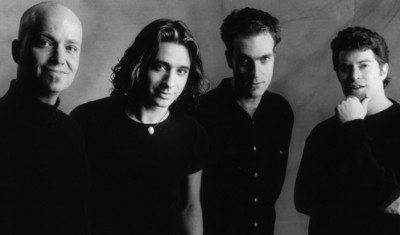You Want Educational Standards? We Used To Have Them.
Mamacita says: Oh please, society, let us learn from the past, just a little bit? Because those in charge of those in charge of the education of our children are doing it all wrong. Real education has nothing to do with money, and everything to do with honor.
“Francie thought it was the most beautiful church in Brooklyn. It was made of old gray stone and had twin spires that rose cleanly into the sky, high above the tallest tenements. Inside, the high vaulted ceilings, narrow deepset stained-glass windows and elaborately carved altars made it a miniature cathedral.”
Betty Smith, A Tree Grows in Brooklyn (New York: Harper & Brothers, 1943) p 390.
This is Most Holy Trinity Church in Brooklyn. Betty Smith used it in her novel and had her heroine, Francie Nolan, in A Tree Grows in Brooklyn, love to look at it, and love knowing that her grandfather had carved the altar as part of his tithe. He had no money, so he donated his considerable talent. Francie’s grandfather was a horrible abusive man, but he honored his commitment to God.
Francie’s grandmother and all but two of her daughters were illiterate, but revered literacy. The grandmother did not at first understand that education was free to all in America, so her two older daughters didn’t go to school. Her two younger daughters, however, were sent to school and kept there as long as possible, until family circumstances required them to go to work. Such was life, back then. Formal education was honored above most other things, but it was also one of the first things to go when times got harder.
Two of my favorite books are A Tree Grows in Brooklyn, by Betty Smith, and Everything But Money, by Sam Levinson. They are a great deal alike in that they are both about immigrant parents, the value of education, the great love of learning that is the source of pride to secure parents, and the sacrifices that good parents make so their children can have better lives.
Our immigrant ancestors came to this country pretty much knowing that there was no chance of them, personally, fulfilling very many of their own dreams and aspirations: all of their hopes and dreams and aspirations were for their children.
Our immigrant ancestors didn’t really move to this country for themselves; they were adults, and the time was long past for them to develop and use their talents in any official or professional capacity, especially in a new land that had customs and language that were both unfamiliar in every possible way . There were exceptions, of course, but the truth is, most of our immigrant ancestors put their own hopes and dreams and ambitions on the back burner so they could concentrate on the hopes and dreams and ambitions they held for their children.
Tenement houses were filled with mothers, grandmothers, maiden aunts, and shirttail relatives, singing in the kitchen that their children might some day sing in Carnegie Hall. Factories and stores were filled with fathers, grandfathers, uncles, and more shirttail relatives, singing at the assembly lines and behind the counters and down in the mines that their children might some day sing in synogogues and cathedrals. People with artistic talent displayed their art with beautiful pies, cakes that were a picture, carved altars in the church, rich embroidery on simple pillow slips, and tailoring that was a work of art. Ancestors who, today, might have organized businesses and found success on the stock market used their skills to make something out of nothing, that their children might have something to make something more out of when it was their turn.
Their children were being educated, and that was enough. Our ancestors looked ahead to the future; they had no time or energy or money to do much for themselves. It was all for the children, and for the future.
Parents too weary from sweatshops and never-ending domestic drudgery didn’t have much time to “play” any more. These parents loved their children far too much to stop and indulge themselves; every nap meant pennies not earned. Parents were there for discipline and meals and clothing and love that was demonstrated by the laying aside of their own desires to focus entirely on the future of their children. NOW was never as important as TOMORROW. This forced their children to be inventive, creative, organized, resourceful, problem-solving, appreciative of things that today’s kids throw away, and hungry enough every night to eat whatever Mother put on the table. A child who asked for something else would have been laughed at.
Adults gave each other blessings that relied on the behavior of the children. “May your children bring you happiness,” “May your children make you proud,” “May your find joy in your children,” etc. Children who misbehaved in school or in public or right there in the house brought shame to their parents and disgrace to the family name. His siblings recoiled from a misbehaving kid, and his mother cried. Families used “shame” to help shape a character that knew what it meant and therefore stayed as far away from it as possible.
Adults have changed. A large percentage of adults put their own desires and urges and feelings and wants before the needs and wants of their children. Kids today don’t care if they bring shame and disgrace to their parents. It’s never their fault anyway; it’s that heartless teacher who doesn’t understand Buddy or Muffy and doesn’t appreciate the cute way he stomps his foot when he’s mad or the adorable way she twists and chews her hair when she’s deciding who to invite to her latest party. Adults get home from work far earlier (usually) than their great-grandparents did, yet adults today are too tired to go to PTA meetings or choir concerts or spelling bees, things their ancestors viewed with such honor (they were not available to peasants in the old country) that they wept and trembled with emotion as they bathed and put on their best clothing in order to show respect to the school and the teacher, and to watch their children represent the family in a scholarly event. (Surprisingly, many adults are not too tired to go to an athletic event.)
Many immigrants came here in the first place so their children could take advantage of the free public education. Illiterate parents pointed with pride to the row of schoolbooks on the kitchen shelf, and boasted that their children could READ THEM! They weren’t worried about new ideas; they encouraged the learning of new things. They did not worry that the new ideas would usurp the old ideas; they just honored all learning and assumed their kids were wise enough to blend the old and the new together and come out with a new “new.” Sam Levinson writes most eloquently and beautifully about his father’s pride in his many sons’ books and accomplishments, even those the old man knew nothing about and knew he never would.
A poorly behaved child brought great sadness and shame to his parents; usually, the sight of his father and mother’s grief, brought on by the child’s poor choices, was enough to straighten the kid out. If not, our ancestors weren’t afraid to use other means to demonstrate to a child that certain behaviors brought certain consequences. Shockingly, this didn’t result in a child quivering with sadness and with no ego or esteem left in his system; it usually resulted in a child who knew better than to try THAT again, by golly.
Modern parents are often so worried about causing their children emotional pain that they ignore or neglect all kinds of opportunities to demonstrate to their children that nice people are a lot more welcome in society than people who feel they have a right to do their own thing regardless of where they are or what the mean old rules might be. A child who is taught in no uncertain terms that one sits quietly at the table, be it at home or elsewhere, eats whatever might be on his plate – or at least tries to eat it – without complaining, and who knows, because he was taught, that one does not get up from the table without permission, and that “please,” “thank you,” and “excuse me” really are magic words. . . well, let us be euphemistic, even though I loathe euphemisms, and just say that nice people of all ages are more welcome and appreciated than are people whose manners and whose tolerance for poor manners need some adjustment. Think of the mall. Think of restaurants.
Our ancestors would be appalled at some of the attitudes and behaviors of their descendants. I know I am.
In many households, the kids are running the show, and the parental helicopter is hovering even over universities and workplaces, lest some “right” is denied and a kid’s self esteem is dealt a blow, deserved or not.
Self esteem. You really don’t want to get me started.
P.S. Self esteem must be EARNED. It’s not a given. Nobody has a RIGHT to it. We’re not born with it. It can’t be presented as a gift. And kids know the difference even if some adults don’t. We have to deserve it. Otherwise, it’s all just a big joke, and the joke’s on the adults.
P.P.S. I guess I got started on it.
Blood, Science, Autism, & McDonald’s Ice Cream
 Mamacita says: First of all, I haven’t had anything to eat since 10 p.m. last night, and as I type this, it’s almost 6 p.m. I had to go into the hospital lab today for a fasting blood test. It was an interesting experience.
Mamacita says: First of all, I haven’t had anything to eat since 10 p.m. last night, and as I type this, it’s almost 6 p.m. I had to go into the hospital lab today for a fasting blood test. It was an interesting experience.
Excuse me while I go get a sandwich.
Where was I? Oh, yes, at the hospital vampire lab.
While I was signing in and promising them ALL of my blood so they could test a little of it, I heard a commotion from one of the little rooms. “Someone is scared,” I said.
No. Someone was autistic, and the social worker, nurses, and techs had been in there with him for several hours trying to persuade him to let them draw a little blood. This was the fourth day of it.
“I want ice cream. McDonald’s ice cream!” the young teen kept insisting. “After you let us draw your blood, you can have McDonald’s ice cream,” he was promised by everyone in the room.
Still, he could get no further than close enough to touch the chair.
I asked the nurse checking me in if this boy had ever seen blood drawn at all. She didn’t think so. I asked her if it might help if he saw my blood drawn. She went and asked the group in the room, and I was invited in.
Fortunately – because I am not an easy lay draw, this time it went smoothly and easily. I said “Why, this doesn’t hurt. I can’t even feel it!” and “This is just a rubber band! Just a rubber band!” and the boy would call me on it whenever he could, reaching out and feeling the wide rubber band and testing the “bounce” of my vein. I said “I get ice cream after this is done!” and he repeated that several times. “Is it over already? I didn’t feel anything! It didn’t hurt a bit! Now I get ice cream!” It was kind of odd to have a crowd of perfect strangers clustered around me as I sat in the chair with a needle in my arm, but who cares?
People educate each other in all kinds of ways, and more often than not it’s those unexpected, unplanned ways that are the most effective.
I was wearing a Spangler Science shirt, and the social worker said he’d seen Steve on “Ellen” and asked me all about the products and experiments, and if they worked for autistic people.
Yes, indeed, I told him. Science isn’t just for geniuses whose brains work “normally,” whatever that might be. Science is for everybody – all ages and levels and personalities, and it connects with every other aspect of curriculum and philosophy and hobby and life. I told him he might start by sharing a story about people eating bread and butter, and then making butter. All science ain’t rocket science.
When I left, the boy had advanced as far as the chair, which was a first, but it was doubtful they’d draw any blood today. Then again, the day isn’t over yet. He was still demanding McDonald’s ice cream, but I hope they didn’t give him  any if he didn’t let them draw his blood. Autistic kids can manipulate, too. They’re not stupid.
any if he didn’t let them draw his blood. Autistic kids can manipulate, too. They’re not stupid.
I gave the social worker the Spot Dot I always carry in my  purse – it’s good for so many things: reading, drawing attention to something, rewards, gaining a child’s confidence, magic, whimsy. . . . and yes, I do consider magic and whimsy to be right up there with reading.
purse – it’s good for so many things: reading, drawing attention to something, rewards, gaining a child’s confidence, magic, whimsy. . . . and yes, I do consider magic and whimsy to be right up there with reading.
The boy and his “crew” will be back tomorrow to try again. Maybe they’re a step closer, and maybe they’re not. Who knows? A kid is a kid, and autism has nothing to do with THAT.
Now I want ice cream. And I’d go out and get some, too, except for three minor details: I’m fat; I’m diabetic; and I’m broke.
If not for those things, I’d be in line at the Pokey Treat Jiffy Treat RIGHT NOW.
Darn minor details.
P.S. You’ll get there, kid. I liked your face. However, the ice cream is only for AFTER you let them draw your blood. A deal is a deal.
There’s Room For Everyone In This World, If Everyone Makes Some Room*

Mamacita says: This is Moxy Fruvous, one of my favorite bands. They’ve been on hiatus for several years, no doubt the day after they discovered that I liked them. I have that effect on bands. And restaurants. I don’t expect them to get back together any time soon, as they’ve all gone on to other things; besides, them rebanding would make me happy and we can’t have that, can we. I still love them, though. They had a beautiful sound.
Go on and click the link:
We got a call to write a song about the war in the Gulf
But we shouldn’t hurt anyone’s feelings
So we tried, then gave up, ’cause there was no such song
But the trying was very revealing. . . .
What makes a person so poisonous righteous
That they’d think less of anyone who just disagreed?
She’s just a pacifist, he’s just a patriot
If I said you were crazy, would you have to fight me?
Fighters for liberty, fighters for power
Fighters for longer turns in the shower
Don’t tell me I can’t fight, ’cause I’ll punch out your lights
And history seems to agree that I would fight you for me
So we read and we watched all the specially selected news
And we learned so much more ’bout the good guys
Won’t you stand by the flag? Was the question unasked
Won’t you join in and fight with the allies?
What could we say…we’re only 25 years old?
With 25 sweet summers, and hot fires in the cold
This kind of life makes that violence unthinkable
We’d like to play hockey, have kids and grow old
Fighters for Texaco, fighters for power
Fighters for longer turns in the shower
Don’t tell me I can’t fight ’cause I’ll punch out your lights
And history seems to agree that I would fight you for me
That us would fight them for we
He’s just a peacenik and she’s just a warhawk
That’s where the beach was, that’s where the sea
What could we say…we’re only 25 years old?
And history seems to agree
that I would fight you for me
That us would fight them for we
Is that how it always will be?
——–Moxy Fruvous
Learn this by heart. Do it. All four parts. (Please.) You know you want to, and I know you can. A Cappella is a kind of magic.
*from Pete’s Dragon






